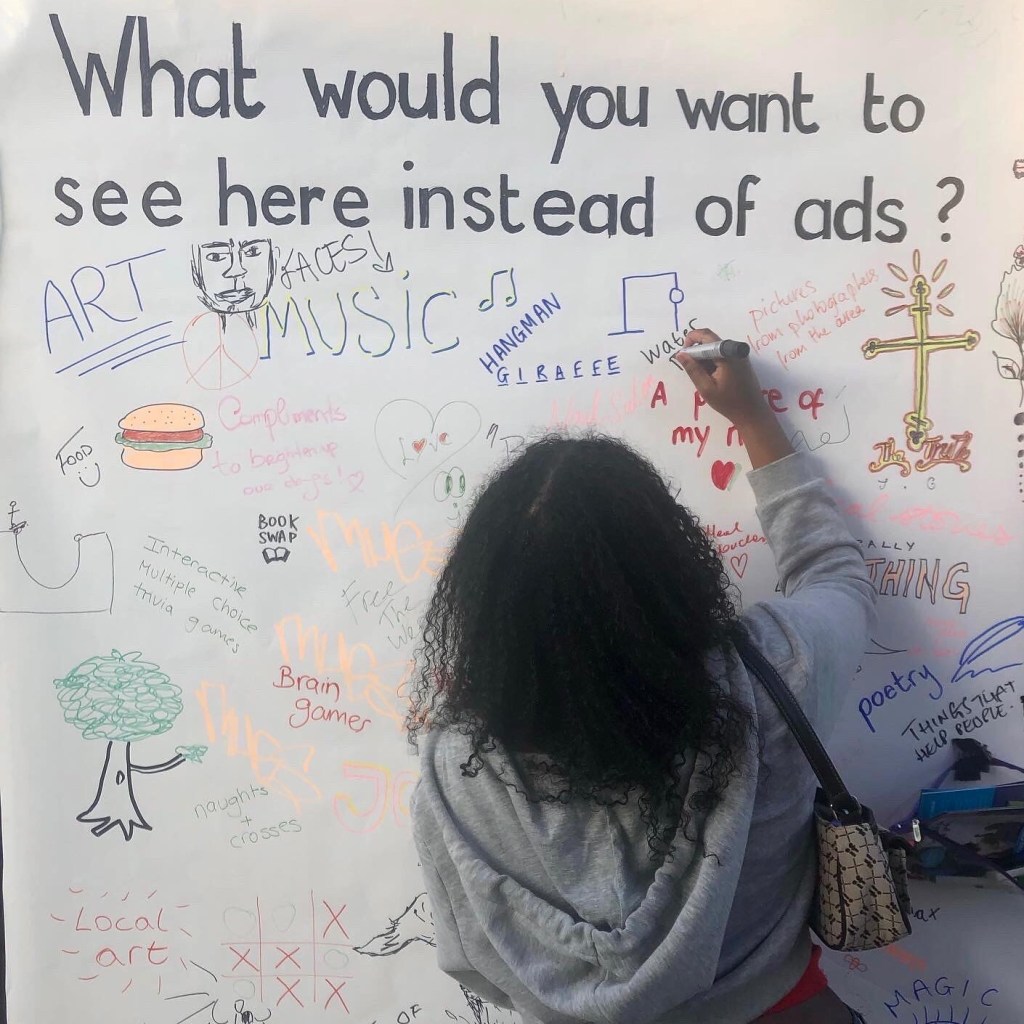Last Friday was a day of significance for Adblock Hackney. Not only did it mark the International Day Against Advertising, but also launched their campaign by covering up digital advertisements in Hackney.
Writing on sheets of paper questions to ask the public such as: ‘What would you want to see here instead of ads?’ and ‘Guess how much energy this digital ad uses?’ to educate residents on the harmful impacts advertising can cause.
It is one of only two groups in the capital, but one of many in a wider network of Adfree Cities, striving for cities across the UK to be ‘free from the pressures of corporate outdoor advertising’.

“Hackney’s full of really creative people and interesting, diverse communities. And, I feel like that’s not represented in advertising or in a public space at all.”, founding member and Hackney resident Alastair Binnie-Lubbock, told Eastlondonlines. A Green Party member and campaigner, Lubbock, says he is excited to be apart of a movement that has “energy, creativity and a lot of potential for success”.
As part of the launch, members of Adblock Hackney took to Shoreditch to ask residents what they would rather see instead of adverts as well as their views on 9 new digital advertisements approved by the council.

Lubbock said : “Most people were really interested and came up to us, kind of even without being accosted to say what’s going on, you know, just to grab a pen and do a little doodle…they were keen to share their views and imagination and what things that they are actually passionate about.”
Suggestions such as: book swaps, poetry, joke dating advice, nothing, a seed bank, a nail salon, brain games, and trees where written and drawn by the public.

‘Visual pollution’, a phrase being used to describe ads was explained by Lubbock: “If you, for example, go out into a forest and you look around, you actually feel it kind of relaxing you and you’re relaxing your brain. But if you have an area that’s full of ads, it’s kind of quite a big assault on your senses…we’re breathing in all of these messages and we don’t really know what the effect is on our health.”

A study last month conducted by the London School of Hygiene and Tropical Medicine (LSHTM), estimated that TfL’s junk food ad ban contributed to a 1,000 calorie decrease in unhealthy purchases in people’s weekly shopping.
Dr Amy Yau, from LSHTM said: “Our study helps to plug that knowledge gap, showing Transport for London’s policy is a potential destination for decision-makers aiming to reduce diet-related disease more widely.”
“So that’s kind of the proof in the pudding” Lubbock concluded, “visual pollution does have a real effect on us and that’s just one aspect. If we’re talking about those other knock on effects, it’s also just the constant need to sell things and to constantly be sold things”.
And it’s not just environmental or sustainable issues that stem this campaign to remove digital billboards. Accessibility, Lubbock claims can be hindered for people with disability access issues and those with vision impairments.
Despite the success of their launch, Adblock Hackney aren’t planning another cover-up in the coming weeks.
Already gaining over 100 signatures on their petition, plans for an information event in April is in the works – inviting people to find out more about the campaign, meeting with their sister Adblock groups across the UK and asking their counsellor candidates before the May elections, to sign up and support the campaign.
“Our plan is to get the council to be proactive on this and have an ethical advertising policy, try and get rid of as much of the adverts as possible, and make sure that they’re not advertising things which go against what they’re trying to achieve for Hackney residents.”




